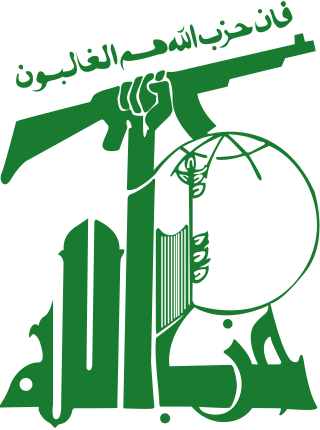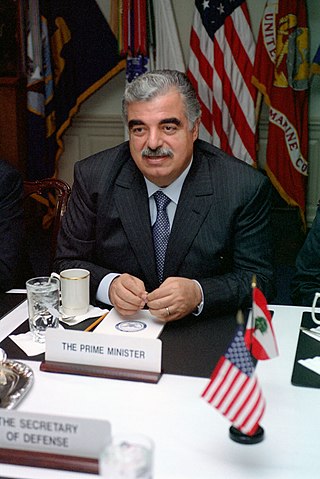Related Research Articles

Hezbollah is a Lebanese Shia Islamist political party and militant group, led by its Secretary-General Hassan Nasrallah since 1992. Hezbollah's paramilitary wing is the Jihad Council, and its political wing is the Loyalty to the Resistance Bloc party in the Lebanese Parliament.

Rafic Bahaa El Deen Al Hariri was a Lebanese business tycoon and politician, who served as the Prime Minister of Lebanon from 1992 to 1998 and again from 2000 until his resignation on 20 October 2004.

Imad Fayez Mughniyeh, alias al-Hajj Radwan, was the founding member of Lebanon's Islamic Jihad Organization and number two in Hezbollah's leadership. Information about Mughniyeh is limited, but he is believed to have been Hezbollah's chief of staff and understood to have overseen Hezbollah's military, intelligence, and security apparatuses. He was one of the main founders of Hezbollah in the 1980s. He has been described as "a brilliant military tactician and very elusive". He was often referred to as an ‘untraceable ghost’.

Walid Kamal Jumblatt is a Lebanese Druze politician and former militia commander who has been leading the Progressive Socialist Party since 1977. While leading the Lebanese National Resistance Front and allying with the Amal Movement during the Lebanese Civil War, he worked closely with Suleiman Frangieh to oppose Amine Gemayel's rule as president in 1983. After the civil war, he initially supported Syria but later led an anti-Assad stance during the start of the Syrian Civil War. He is still active in politics, most recently leading his party, the Progressive Socialist Party (PSP) in the 2022 Lebanese general election.

Assef Shawkat was the deputy Minister of Defense of Syria from September 2011 until his death in July 2012.

The South Lebanon conflict, designated by Israel as the Security Zone in Lebanon Campaign, was a protracted armed conflict that took place in southern Lebanon from 1985 to 2000. It saw fighting between the Christian-dominated South Lebanon Army (SLA) and Hezbollah-led Muslim guerrillas within the Israeli-occupied "Security Zone"; the SLA had military and logistical support from the Israel Defense Forces over the course of the conflict and operated under the jurisdiction of the Israeli-backed South Lebanon provisional administration, which succeeded the earlier Israeli-backed State of Free Lebanon. It can also refer to the continuation of the earlier conflict in this region that began with the Palestinian insurgency in southern Lebanon, which targeted Christian Lebanese factions and Israel following the expulsion of the Palestine Liberation Organization (PLO) from Jordan after Black September. Historical tensions between Palestinian refugees and Lebanese factions fomented the violent internal political struggle between the latter. In light of these factors, the South Lebanon conflict can be seen as a part of the Lebanese Civil War.

The 2006 Lebanon War, also called the 2006 Israel–Hezbollah War and known in Lebanon as the July War and in Israel as the Second Lebanon War, was a 34-day military conflict in Lebanon, Northern Israel and the Golan Heights. The principal parties were Hezbollah paramilitary forces and the Israel Defense Forces (IDF). The conflict started on 12 July 2006, and continued until a United Nations-brokered ceasefire went into effect in the morning on 14 August 2006, though it formally ended on 8 September 2006 when Israel lifted its naval blockade of Lebanon. Due to unprecedented Iranian military support to Hezbollah before and during the war, some consider it the first round of the Iran–Israel proxy conflict, rather than a continuation of the Arab–Israeli conflict.

On 14 February 2005, former Prime Minister of Lebanon Rafic Hariri was killed along with 21 others in an explosion in Beirut, Lebanon. Explosives equivalent to around 1,000 kilograms of TNT were detonated as his motorcade drove near the St. George Hotel. Among the dead were several of Hariri's bodyguards and former Minister of the Economy, Bassel Fleihan.

The first of the two battles in al-Qusayr was fought by the Syrian army and Shabiha against the Free Syrian Army in the small city of Al-Qusayr, near Homs, during late winter and spring of 2012.

Between 2011 and 2017, fighting from the Syrian Civil War spilled over into Lebanon as opponents and supporters of the Syrian Arab Republic traveled to Lebanon to fight and attack each other on Lebanese soil. The Syrian conflict stoked a resurgence of sectarian violence in Lebanon, with many of Lebanon's Sunni Muslims supporting the rebels in Syria, while many of Lebanon's Shi'a Muslims supporting the Syrian government which is led by Bashar Al-Assad, whose Alawite minority is usually described as an offshoot of Shi'a Islam. Killings, unrest and sectarian kidnappings across Lebanon resulted.
Mustafa Badreddine, also known as Mustafa Badr Al Din, Mustafa Amine Badreddine, Mustafa Youssef Badreddine, Sami Issa, and Elias Fouad Saab, was a military leader of Hezbollah and both the cousin and brother-in-law of Imad Mughniyah. He was nicknamed Dhu al-Fiqar referring to the legendary sword of Imam Ali. His death is seen as one of the biggest blows in the Hezbollah leadership.

The Iran–Israel proxy conflict, also known as the Iran–Israel proxy war or Iran–Israel Cold War, is an ongoing proxy war between Iran and Israel. The conflict involves threats and hostility by Iran's leaders against Israel, and their declared objective to dissolve the Jewish state on the basis of, or not on the basis of anti-semitic rhetoric and reasoning.
The Lebanese–Syrian border clashes were a series of clashes on the Lebanon–Syria border caused by the ongoing Syrian Civil War.

The Rif Dimashq offensive was a Syrian government forces and allies offensive in the Rif Dimashq Governorate, that was launched in mid-September 2013, as part of the Syrian Civil War.

The Battle of Qalamoun started on 15 November 2013, with air strikes on the town of Qara, in the strategic Qalamoun region, in an attempt by the Syrian Army to cut rebel supply lines to Damascus from Lebanon. The strategic region had been used by rebel forces as a rear base for its operations around the capital Damascus. For its part, government forces had been using the nearby highway to link Damascus with the central Homs province and had multiple weapons depots in the area. The battle was primarily led on the rebel side by the Al-Nusra Front.
From its inception, the Syrian Civil War has produced and inspired a great deal of strife and unrest in the nation of Lebanon. Prior to the Battle of Arsal in August 2014, the Lebanese Army has tried to keep out of it and the violence has been mostly between various factions within the country and overt Syrian involvement has been limited to airstrikes and occasional accidental incursions.
The January 2015 Mazraat Amal incident was an airstrike against a two-car convoy that killed six Hezbollah fighters, including two prominent commanders, and a general of the Iranian Revolutionary Guards (IRGC), Mohammad Ali Allahdadi, at al-Amal Farms in the Quneitra District of Syria, in the Eastern Golan Heights, on 18 January 2015, during the Syrian Civil War. The attack was largely attributed to Israel, which did not officially confirm that it carried it out, as usual. Hezbollah and IRGC held Israel responsible and threatened to retaliate. On 19 January 2015, Al-Nusra Front member Abu Azzam al-Idlibi claimed that Jihad Mughniyeh and the other Hezbollah fighters were killed in an Al-Nusra Front ambush at Jaroud in the Qalamoun Mountains in the Al-Qutayfah District northeast of Damascus, claiming that it "will be the end of the Persian project, God willing."

Hezbollah involvement in the Syrian Civil War has been substantial since the beginning of armed insurgency phase of the Syrian Civil War in 2011, and evolved into active support for Ba'athist government forces and troop deployment from 2012 onwards. By 2014, Hezbollah was deployed across Syria. Hezbollah has also been very active in preventing Al-Nusra Front and Islamic State penetration into Lebanon, being one of the most active forces in the Syrian Civil War spillover in Lebanon.
The Iran–Israel conflict during the Syrian civil war refers to the Iranian-Israeli standoff in and around Syria during the Syrian conflict. With increasing Iranian involvement in Syria from 2011 onwards, the conflict shifted from a proxy war into a direct confrontation by early 2018.
References
- 1 2 "Hezbollah buries top commander 'killed in Syria'". Middle East Online. 3 October 2012. Archived from the original on 3 March 2016. Retrieved 1 December 2012.
- ↑ Elior Levy (2 October 2012). "Report: Top Hezbollah operative in Syria killed". Ynetnews. Retrieved 4 October 2012.
- ↑ Ana Maria Luca (4 October 2012). "How involved is Hezbollah in Syria?". Now Lebanon. Archived from the original on 6 October 2012. Retrieved 4 October 2012.
- ↑ Jacinto, Leela (7 October 2012). "Are Hezbollah's mysterious 'martyrs' dying in Syria?". France 24. Retrieved 1 December 2012.
- ↑ "Hezbollah military commander 'killed in Syria'". BBC. 2 October 2012. Retrieved 4 October 2012.
- ↑ "Hezbollah commander reported killed in Syria". CBC News. Associated Press. 2 October 2012. Retrieved 1 December 2012.
- ↑ Martin Chulov (2 October 2012). "Syria bomb blast kills Hezbollah operative". The Guardian. Retrieved 4 October 2012.